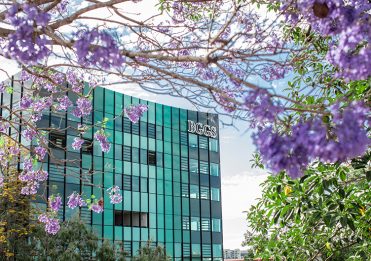When the World Around Us Feels out of Control, It’s Time to Turn Inwards
Reflections on Living through a Global Pandemic
You might say, ‘What a dreadful day,’ without realizing that the cold, the wind, and the rain or whatever condition you react to are not dreadful. They are as they are. What is dreadful is your reaction, your inner resistance to it, and the emotion that is created by that resistance. (Ekhart Tolle, 2006, p.77)
Dr Alix Vann, School Psychologist
In subtle and well-socialised ways, we are often encouraged to look to the world around us to find a sense of certainty and stability. The narrative of ‘performance = success = happiness = stability’ pervades the approach to life for many. Experiences like the current COVID-19 pandemic force us, on a global scale, to take stock of this notion, as we realise that no matter what, none of us is immune to feeling, and none of us can truly control what goes on around us.
For some, this realisation about the inevitability of feeling ‘out of control’ of the external environment has led to difficult feelings—worry and hopelessness in the face of so much uncertainty, and helplessness to be able to affect the state of play. Metaphors about being ‘lost in the storm’ have been rife during this time, as anxiety rates in Australia have doubled (ABS, 2020) and mental health issues have been touted as the ‘second wave of pandemic’ (Professor Patrick McGorry, 2020). It is important to acknowledge the collective trauma the human population has experienced during this viral epidemic, similar to times of war and natural disaster, when ‘the population is on alert, feeling unsafe, overwhelmed and helpless when facing ongoing unpredictability’ (Centrestone, 2020). And yet, no matter how big or small the change, or how ‘global’ the experience of upheaval, the only environment we ever truly have control over is our internal one.
‘People are disturbed not by things but rather by the views which they take of them’ (Epictetus, Greek Philosopher, 1st Century AD). Philosophers, monks, psychologists and scientists all agree: it is our response to circumstances that determines our experience of them. When we are in the midst of strong emotions, unprecedented change, and serious challenge, it is easy to lose sight of this powerful, grounding human superpower: it is our response to circumstances that determines our experience of them.
For most people, uncertainty and unpredictability can feel intolerable. When things feel out of control, the urge is often to try to rein things in even more tightly, to hold onto the illusion of control, and this can occur at the expense of how that makes us feel—we avoid, distract, research excessively, and put all the energy we can muster into trying to predict the future. In the short term, these strategies often provide some momentary relief, but in the long term, these actions simply reinforce our intolerance of uncertainty itself, adding to the anxiety that this feeling creates (Harris, 2009). Turning inwards is more likely to provide us with the sense of stability and solidity that we crave. A hallmark of being mentally healthy is the ability to be flexible and accepting—which often results in letting go of control (Sanger, 2018). This applies both to how we approach our behaviours and responses, and to how we engage with our thoughts and feelings.
The practice of flexibility and acceptance needs a degree of presence and mindfulness—we need to be able to notice what is happening around us, and what effect this has on our internal responses. We need to intentionally pay attention to our experience, in the moment, and simply notice it, without rushing in to judge or change it (Harris, 2009). Learning how to still our busy minds, like any skill, requires practice and patience. Especially in the face of the temptation to focus outwards and micromanage the world around us, the very concept of slowing down and allowing the mind to rest can actually feel quite confronting. This may partly explain the ‘second wave of pandemic’, as home isolation has left us all with more time and space for the mind to still, yet perhaps without adequate skills to consciously allow this. With repeated practice, mindfulness and acceptance helps us to keep truly in touch with own experience, so that we can know when to keep pushing or when to pull back, and we can more readily tune into what matters to us, and what we need.
Clinical psychologists spend a lot of time talking with people about what they need, and in my experience, it is often very difficult for people to define what they need, and to know what helps them to take care of themselves. Our sense of internal stability is fed by our capacity for self-care—like the mast of the ship, the way we look after ourselves determines which way the sails will catch in the wind, and in which direction our experience will be guided.
The simplicity of the concept of self-care contrasts with the complexity of its reality. It sounds relatively easy to take good care of yourself—just take an action that improves your health or wellbeing, and look after your needs as they arise. Most of us know that we have basic human needs that must be met in order to survive—we need a roof over our head, food on our table, and people to care for us. But self-care is not easy. It is often likened to the metaphor of ‘filling your cup’: when we spend each day ‘pouring’ our energy, attention and service into any number of different parts of life, we must find a way to replenish what we have given out, so that we don’t ‘run dry’. Too often, we see people running dry, whether that looks like exhaustion, perfectionism, insomnia, depression, over-scheduling or under-scheduling. Arguably, these are all symptoms of a human psyche that needs to be cared for—but how?
COVID-19 has pushed us in ways most of us haven’t experienced or considered before. As US-based psychotherapist Dr Jennifer Kunst states:
It is not an exaggeration to say that we are having the psychological fight of our lives, taxed as we are beyond imagination as we move through the vicissitudes of this global pandemic. As we gear up for a re-opening of the country (and the world), many are seeking ways to keep sane and grounded. We must ready ourselves for the “new normal” as this will be a gradual, two-steps-forward-one-step-back, long-haul process. (2020)
Thankfully, in Australia we have avoided some of the frightening experiences of mortality faced by countries like the US and within Europe, but this does not mean we have been immune to news of these possibilities, to our minds reacting as if this was occurring to us, or to resisting the feelings of fear and loss that international news may still have provoked. Now, more than ever, we need be cognisant of the role our reactions play in the way we are feeling. If we can prioritise tuning in to and taking care of ourselves, we won’t run dry while the marathon recovery from a global pandemic continues. Below are some small steps that might assist our ongoing approach to the uncertainty of the ‘new normal’.
Coping with Uncertainty: Tune Inwards to Take Care
1. Stop. Breathe. Allow yourself some space to reflect and tune in to your thoughts, feelings, and body sensations. This does not need to be a meditative practice—it just needs to be quiet and reflective.
2. Notice what you are feeling. Name your feelings, without judgement, to help your central nervous system settle and your feelings to stay in perspective. Tell yourself: I may not like or want this feeling, but I can tolerate this feeling for the time being.
3. Check your filter. What lens are you seeing this event through? Are you getting swept away in the ‘what ifs’ of your problem-solving mind? Are you only able to see the negatives while discounting any other aspect of your experience? Is your inner critic running away with the ‘you’re not good enough’ narrative to explain everything going on around you? Try a helpful noticing statement of ‘There goes my mind, just worrying again’.
4. Practise responding rather than reacting. If you’ve been able to stop, notice, and reflect, you are in wonderful position to feel empowered to choose your next step in a purposeful response, rather than to react instinctively, in an automatic reflex.
5. Take valued action. Do something that creates meaning, purpose and richness in your life, regardless of what is going on around you. Ask yourself: What can you do right now, no matter how small, which improves life for yourself or others? What kind of person do you want to be in the face of crisis?
6. Be kind—to yourself and others. Acts of kindness and compassion are always within our control. They connect us to each other as shared human experiences, they assist us to focus on gratitude and nurturing, and they offer our minds an alternative to the ‘doom and gloom’ that the external world often entices us to believe.
References
Australian Bureau of Statistics. (2020). Household Impacts of COVID-19 Survey, 29 April – 4 May (cat. no. 4940.0). https://www.abs.gov.au/ausstats/abs%40.nsf/mediareleasesbyCatalogue/DB259787916733E4CA25855B0003B21C?OpenDocument
Centrestone. (Accessed 20 May 2020). Living in uncertain times: Coping with a new “normal”. https://centerstone.org/our-resources/health-wellness/living-in-uncertain-times-coping-with-a-new-normal/
Harris, R. (2009). ACT made simple. New Harbinger Publications, Inc: Oakland, CA.
Kunst, J. (2020). How to manage gracefully in the new normal. https://www.psychologytoday.com/au/blog/headshrinkers-guide-the-galaxy/202004/how-manage-gracefully-in-the-new-normal
McGorry, P. (2020). As cited in Woodley, M. (2020). Mental health issues the ‘second wave’ of pandemic. https://www1.racgp.org.au/newsgp/clinical/mental-health-issues-the-second-wave-of-pandemic
Sanger, S. (2018). The illusion of control. https://psychcentral.com/blog/the-illusion-of-control/
Tolle, E. (2006). A New Earth: Awakening to Your Life’s Purpose. Penguin



